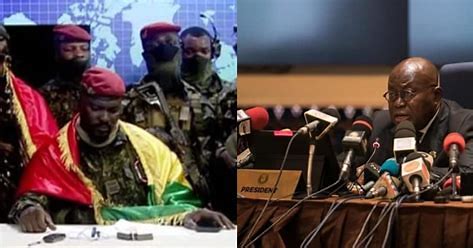
West Africa’s main political and economic bloc has suspended Guinea’s membership following a weekend military coup that ousted President Alpha Conde and dealt the latest in a flurry of setbacks to democracy in the region.
During a virtual summit, leaders from the 15-member Economic Community of West African States (Ecowas) demanded a return to the constitutional order and Conde’s immediate release, and also agreed to send a high-level mission to Guinea as soon as Thursday, said Burkina Faso’s Foreign Minister Alpha Barry.
“At the end of that mission, Ecowas should be able to re-examine its position,” Barry told reporters.
He did not announce any immediate economic sanctions against Guinea, as Ecowas imposed against Mali following a coup there in August 2020.
Some experts say Ecowas’s leverage with Guinea could be limited, in part because the country is not a member of the West African currency union and not landlocked like Mali.
The economic bloc’s response is being closely watched amid criticism from pro-democracy advocates that it has not stood up robustly enough in recent months against democratic backsliding in West Africa.
Ecowas remained silent last year as Conde and Ivory Coast President Alassane Ouattara sought third terms after changing constitutions that would have forced them to step down, moves denounced as illegal by their opponents.
Activists say this has contributed to West Africans’ loss of faith in democracy and made military coups more likely.
Mali’s military staged a second coup in May this year. ECOWAS said on Tuesday it was concerned transitional authorities there had not made sufficient progress toward organising elections next February as promised.
Guinea’s coup leader, Mamady Doumbouya, a former French legionnaire, has pledged to install a unified, transitional government but has not said when or how that will happen.
In an apparent gesture to Conde’s civilian opponents, at least 80 political prisoners detained by the president were released on Tuesday evening, many of whom had campaigned against his constitutional change.
Doumbouya also met the heads of Guinea’s various military branches for the first time on Tuesday, hoping to unify the country’s armed forces under the junta’s command.
Guinea’s main opposition leader, Cellou Dalein Diallo, who finished runner-up to Conde in three successive elections, told Reuters on Tuesday he would be open to participating in a transition back to constitutional governance.
In a statement on Tuesday evening, Conde’s party said it “noted the advent of new authorities at the head of the country” and called for the president’s swift and unconditional release.
Since the putsch, life in the streets of Conakry appears to have returned to normal, with some military checkpoints removed.
Fears that the power struggle could hinder Guinea’s production of bauxite, a mineral used to make aluminium, have begun to ease. The country’s largest foreign operators say they have continued to operate without interruption.
Aluminium hit a fresh ten year high on Monday after news broke of unrest in Guinea, which holds the world’s largest bauxite reserves. Doumbouya has pledged that mining will continue unhindered.
- An AP report











